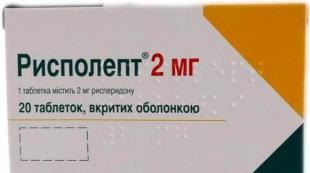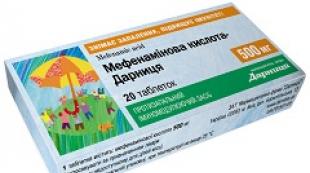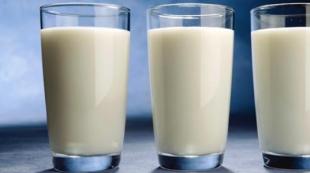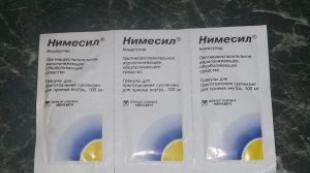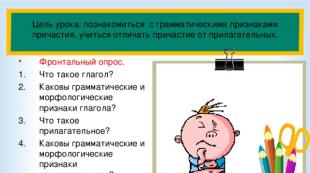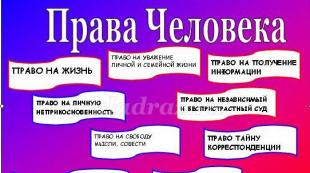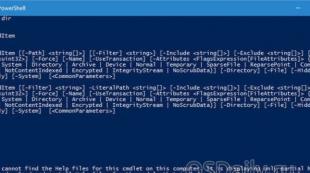Treatment of bronchitis in adults: time-tested folk remedies. How to treat obstructive bronchitis in children with folk remedies
The number of patients suffering from this severe respiratory disease is rapidly increasing. As predicted by WHO, obstructive bronchitis will soon become the second reason in the world deaths, ahead of cancer, heart attacks and strokes.
Drug treatment of obstructive bronchitis
What is obstructive bronchitis and how to treat it? There are many reasons why the lower respiratory tract becomes irritated and inflamed: harmful chemical compounds in the air, dust, plant secretions, bacterial, viral infection. The lumens of the bronchi and their small branches of the bronchioles swell and narrow. The accumulating phlegm, not finding a way out, stagnates. As a result, a person has difficulty breathing and is overcome by attacks of suffocation.
However, this is not so bad. Obstruction (muscle spasms) triggers dangerous mechanism degradation bronchial tree. Gradually pathological process becomes almost irreversible. Obstructive bronchitis is a disease typical of adults. For children, it is typical to have a long acute inflammation lower respiratory tract, especially if the child has a weak immune system.
Often the disease occurs against the background of rhinitis, sinusitis, pharyngitis, and tonsillitis. Treatment of chronic obstructive bronchitis in adults requires not relieving symptoms, not episodic therapy, but patient comprehensive sanitation of the entire respiratory system, which can take more than one month. Only under this condition serious disease stops progressing.
Treatment is distinguished by a variety of schemes, which take into account the stages of the disease and the degree of destruction of the respiratory organs. No medicine will bring the desired effect if a person continues to smoke. As soon as the patient gives up nicotine, the condition of his bronchi improves significantly, even in heavy smokers With neglected forms illness.
Bronchodilators
These are bronchodilators, bronchodilators, as pharmacists and doctors call such medications. Medicines with different mechanisms of action are combined into a single group, since their general purpose is to eliminate spasms of diseased bronchi. To cure a patient diagnosed with obstructive bronchitis, such a basic drug is urgently needed. Spasms quickly pass as soon as the bronchi expand.
Anticholinergics
Basic medications for relieving bronchospasm attacks:
- Atrovent (ipratropium bromide) is an aerosol and solution for inhalation, acting quickly, after 10-15 minutes, but not for long, about 5 hours;
- Berodual (ipratropium bromide plus Fenoterol) – also short acting;
- Spiriva (tiotropium bromide) is a long-acting inhalation powder.
Beta-agonists
The effect of short-acting medications occurs in a matter of minutes and lasts about 5 hours. They can treat obstructive bronchitis with acute attacks bronchospasms. The most famous:
- Salbutamol – aerosol for inhalation with a dispenser (injection solution and tablets are less in demand), ambulance for asthmatic attacks;
- Fenoterol tablets are more effective than Salbutamol;
- Ipradol (Hexoprenaline) – dosed aerosol.
The effect of long-acting medications occurs in about 15 minutes, but lasts twice as long, about 10-12 hours:
- Clenbuterol is a syrup that can be used for treatment after the first trimester of pregnancy, during breastfeeding, infancy children;
- Salmeterol – for inhalation, preferable for heart pathologies;
- Foradil (Formoterol) - both tablets and powder for inhalation.

Xanthine derivatives
These drugs for the relief of spastic attacks, which cause the obstructive form of the disease, are produced both in the form of tablets, capsules, and injection solutions. Popular methylxanthines are:
- Theophylline;
- Aminophylline;
- Theobromine;
- Eufillin;
- extended-release tablets: Theotard, Teopek, Retafil.
Expectorants and mucolytics
Expectorants and mucolytics are effective, thinning the viscous secretion, which is more easily removed from the bronchi. Medicines in this group do not begin to treat the disease immediately, but after a day or two or even a week. Adults and children are prescribed medications such as:
- Bromhexine;
- ACC (Acetylcysteine);
- Ambroxol (Lazolvan);
- Bronchicum.
Antibiotics for exacerbations
You can't get by with ineffective antibiotics. If the patient can be treated at home, tablets are prescribed. In case of severe exacerbations of the disease, injections are necessary. Antibiotics of choice:
- Amoxicillin;
- Amoxiclav (Amoxicillin plus clavulanic acid);
- Levofloxacin or Moxifloxacin;
- Azithromycin (Sumamed, Hemomycin).

Effective antihistamines
These medications should be taken by those whose disease is caused by allergic reactions. Many doctors prescribe drugs last generations, which have a minimum side effects. As the famous doctor Komarovsky warns, old medications: Suprastin, Tavegil, Diprazine, Diphenhydramine - increase the viscosity of sputum in the bronchi and lungs, increasing the risk of pneumonia.
Effective products for adults and children:
- Loratadine (Claritin);
- Cetirizine (Zyrtec);
- Desloratadine (Erius, Dezal);
- Dimetinden (Fenistil).
Hormonal drugs
How is obstructive bronchitis treated if spasms cannot be eliminated with bronchodilators, dilators and expectorants? Assign hormonal drugs. To reduce them negative effects, medications can be started in the form of inhalations or tablets. If this does not help, injections are necessary. The following medications are considered in demand:
- aerosols: Budesonide, Fluticasone, Ingacort, Beclazon Eco;
- tablets: Prednisolone, Triamcinolone;
- injection solutions: Prednisole, Dexamethasone.

Alternative medicine methods
These types of therapy, in combination with medications, activate the body's reserves to fight the disease. This eliminates the need for large doses of medications. Practiced:
- manual therapy;
- acupuncture;
- acupressure;
- speleotherapy (treatment in salt caves or cameras);
- homeopathy.
Homeopathy treatment
The following drugs based on natural raw materials are considered effective:
- Antimonium Tartaricum rub, prescribed for very viscous mucus, suffocation;
- Belladonna drops, which help eliminate the inflammatory process;
- ointment, Bryonia balls, relieving chest pain;
- Nux Vomica drops, eliminating coughing attacks.
Breathing exercises
Breathing training sets also help treat obstructive bronchitis. Popular gymnastics exercises by Strelnikova (performed standing or sitting 12-15 times):
1. "Hugs." Raise your arms at neck level, bend at the elbows. Then, simultaneously with inhalation, move them, as if clasping your shoulders. As you exhale, spread your arms.
2. "Pump". When inhaling, bend down slightly, and when exhaling, straighten up.
3. “Don’t breathe.” Leaning slightly, take an energetic breath through your nose, do not breathe for at least 10-15 seconds, then exhale.

Massage
It is recommended to clear your throat during the procedure. vibration massage: lying on his stomach, the patient melodiously pronounces vowel sounds, and the masseur repeatedly taps the back with his palms. The sputum leaves better, the disease recedes. Acupressure relaxes tense muscles of the chest and bronchi. At the same time, biologically active zones are activated. Postural drainage is effective: changing body positions, the patient takes deep breaths through his nose and exhales through pursed lips, then clears his throat.
When the patient was diagnosed with obstructive bronchitis, along with the main drug treatment traditional methods are practiced.
With such a thorough approach, you can count on a quick recovery and no complications.
Recipes alternative medicine will become a real salvation if medicines from the pharmacy do not help or provoke adverse reactions in the body.
Manifestations of the disease
Obstructive bronchitis is a stage of bronchitis in which there is a narrowing of the lumen of the bronchi. There is an active accumulation of viscous sputum, which does not want to come out.
Symptoms of the disease include:
- constant cough (boring, dry, weak);
- difficulty breathing between coughing attacks and after them;
- whistling, wheezing on inhalation and exhalation;
- pain in the throat, back, chest;
- general weakness, fatigue.
Also, with the disease, body temperature rises. Very for a long time it stays between 37 and 38 degrees. The patient notes a runny nose, nasal congestion, and redness of the throat.
This type of bronchitis is a chronic diffuse allergic inflammatory process. It appears in the background previous sore throat, influenza or acute bronchitis, turning into a chronic form.
Allergies can safely be called a supporting factor. This pathological condition in the bronchi seriously complicates recovery.
Other prerequisites for the disease include passive smoking, unfavorable environmental and social conditions.
Obstructive bronchitis treatment with folk remedies
To recover from this form of bronchitis, bronchospasms and inflammation should be eliminated. Treatment is also aimed at combating pathogenic microorganisms, allergies, stimulation of sputum discharge.
There are many popular treatment recipes. The most popular and effective ones should be considered. So, treatment can be carried out using onions. To do this, peel 2 onions and boil for 2 hours. Then:
- the vegetable is chopped;
- season 4 tbsp. spoons of sugar and honey;
- add 2 tbsp. spoons of apple vinegar.
The mass is taken one teaspoon every hour for 5 days. In this way, it is possible to achieve expectoration of sputum.
You can treat yourself with tangerines. It is required to make an infusion from 50 g of dry citrus peels. The zest is crushed, poured into 1 liter of boiling water and simmered over low heat for at least an hour. Add another 50 g of dry zest to the hot liquid and leave in a warm place for 2 hours.
The finished product is filtered through cheesecloth and consumed according to the scheme. The first part of the scheme provides gradual decline portions. In the morning, take 5 tablespoons of infusion on an empty stomach, then, every 60 minutes, consume a portion reduced by 1 spoon.
According to the second part of the scheme, the portion increases. After the patient takes the last spoonful of the product, take a break for 2 hours. Then, every hour, take 1 more spoonful of infusion. Then everyone starts from the very beginning. Course – 5 days.
You can try taking honey with viburnum. The mixture helps to cope well with barking hacking cough. To prepare you should take:
- 200 g viburnum berries;
- 100 g water;
- 200 g of natural honey.
The ingredients are cooked over low heat. Do this until the liquid has completely evaporated. Once it cools down, use a teaspoon every 3 hours.
For wet coughs with obstructed sputum drainage, herbal remedies are used. Components medicinal mixture will be as follows:
- marshmallow;
- sage;
- Dill seeds;
- fennel;
- coltsfoot.
 Place half a teaspoon of each plant in a thermos and add a liter of boiling water. The resulting liquid is infused for an hour. When it cools down, add 3 tablespoons of honey and take 3 times a day for a week.
Place half a teaspoon of each plant in a thermos and add a liter of boiling water. The resulting liquid is infused for an hour. When it cools down, add 3 tablespoons of honey and take 3 times a day for a week.
Treatment of obstructive bronchitis will be accelerated by drinking tea made from buckwheat flowers. You need to pour 40 g of the plant into a liter of boiling water, infuse it and drink it instead of regular black tea. This drink will soften your throat and improve expectoration.
For the same purposes, take milk from carrot juice. The ingredients are diluted with water in equal proportions. You need to take the solution 5-6 times during the day.
Obstructive bronchitis treatment folk remedies can be done with lingonberry syrup. If you take the syrup along with bee honey, it helps to cough up accumulated mucus.
An infusion of spring primrose is also prepared:
- 1 tbsp. a spoonful of dry plant roots;
- a glass of boiling water.
To get all possible benefits The infusion is kept in a water bath for half an hour. The cooled broth is filtered through a sieve, take 2 tablespoons three times a day after meals.
You can prepare a decoction of turnips. This drink:
- characterized by bactericidal properties;
The recipe is simple: pour 2 tablespoons of grated vegetable into a glass of boiling water. The container with the product is wrapped in a towel and left to infuse for 2 hours. You need to take the infusion one tablespoon 4 times a day.
Well, the last option for treating obstructive bronchitis is the herbal collection of licorice. Many pharmacies medications anti-cough medications are based on this sweet plant. You need to chop 15 g of fennel fruit, 25 g of licorice root, 40 g of marshmallow root and 25 g of coltsfoot leaf, pour half a liter of boiling water.
Take the decoction at least 5 times a day, 1-2 tablespoons.
Treatment with external means
External warming agents will be an addition to alternative medicine medications taken orally. Such methods of treating bronchitis are used only if the acute period of the disease has already passed, and the body temperature does not rise above 37 degrees for several days.
The use of warming procedures at fever is strictly not recommended. There is a high risk of overheating. Instead of receiving beneficial therapeutic effects, the patient will suffer heatstroke.
In this case, it is advisable to use non-warming procedures. These include, for example, iodine grid. Iodine perfectly dissolves and relieves inflammation. The procedure is carried out as follows:
- on cotton wool or cotton swab iodine drops;
- Transverse and longitudinal stripes in the form of a lattice are drawn on the patient’s chest.
The grid can be drawn on the back. However, you cannot treat your back and chest at the same time. It'll get too much heavy load on the body. Caution should be exercised during treatment, as iodine can cause a chemical burn.
Allowed to rub irritating ointments. They quickly relieve tension in the chest. For these purposes, Zvezdochka balm is ideal. Thanks to unique composition blood rushes to the bronchi area. The spasm is eliminated and the intensity of the cough decreases. The essential oils contained in the balm are characterized by a bactericidal effect.
At night, you can make a compress from internal bear, pork or lamb fat. Lard is heated in a water bath, mixed with mustard, black pepper and honey. Such a remedy:
- relieves shortness of breath, cough;
- does not irritate the skin.
 The warm mixture is applied to the patient’s back or chest, covered with cling film and a woolen scarf on top. It is good if a patient with bronchitis covers himself with a warm blanket and lies in bed for at least an hour. Ideally, apply the compress at night.
The warm mixture is applied to the patient’s back or chest, covered with cling film and a woolen scarf on top. It is good if a patient with bronchitis covers himself with a warm blanket and lies in bed for at least an hour. Ideally, apply the compress at night.
Consuming badger fat will help enhance the effect of rubbing. You can buy it at the pharmacy.
Some alternative medicine doctors recommend rubbing garlic for obstructive bronchitis. The vegetable is crushed in a blender or chopped very finely. Then grind it to a paste. The patient's feet are rubbed with garlic, and warm socks are put on top. If a person tolerates it normally similar treatment, you can leave your socks on until the morning.
You can also rub yourself with onions if you mix it with goose fat. The recipe does not involve financial or time costs:
- 1 onion chopped;
- mixed with fat in equal proportions.
The mixture is rubbed into the skin of the chest and back using circular massage movements. It is best to do this at night, since after rubbing you need to stay warm for a long time.
It doesn’t make much difference which treatment recipe the patient chooses. Each of the proposed products is completely natural, non-addictive, adverse reactions. However, before use, it would not hurt to consult with a therapist or family doctor.
Learn more about how to treat bronchitis in the video in this article.
If obstructive bronchitis occurs in adults and children, treatment is carried out using medicinal methods and folk remedies.
Treatment effectiveness of this disease depends on timely diagnosis And early start therapy.
For timely diagnosis, it is necessary to know the signs of obstructive bronchitis in order to suspect this pathology in time.
The disease is especially severe in children early age. Bronchitis with obstruction is characterized by the fact that there is a violation of the removal of mucus from the lumens of the bronchi.
As with any inflammation, there is an increased production of mucus by the cells of the mucous membrane.
But in the presence of obstruction, mucus clogs the lumen of the bronchi, causing spasm muscle cells walls of the bronchial tree.
Causes of the disease
Common in children acute course obstructive bronchitis, and among adults the most common is chronic obstructive bronchitis.
The following main reasons for the development of bronchitis with obstruction can be identified:
- Infection viral infections with damage to the upper respiratory tract;
- Infection bacterial infections with the development of inflammation of the mucous membranes of the bronchial tree;
- Allergens enter the mucous membranes of the bronchi with the development of allergic inflammation.
The following factors predispose to the development of bronchitis with an obstructive component:
- frequent hypothermia;
- hereditary predisposition;
- primary or secondary decrease in the body’s immune forces;
- constant overwork;
- prolonged stress;
- smoking;
- inhalation of polluted air in industrial cities or in factories.
Children may develop spasms muscle fibers the walls of the bronchi as a result of the ingress of food particles or small objects.
Symptoms of the disease
The onset of bronchitis with obstruction depends directly on the cause that caused inflammation of the mucous membranes of the bronchial tree.
So for allergic and viral etiologies acute processes develop during the inflammatory process. With the allergic nature of the disease, children develop a very rapid onset and increase in signs of bronchitis.
The slow onset of the disease is observed mainly in adults, and a chronic form of obstructive bronchitis often develops.
There is also a slow development and increase in all signs of the disease. For acute forms bronchitis of viral origin is characteristic following symptoms diseases:
- the presence of intoxication of the body;
- the temperature rises from low-grade to febrile, depending on the type of viral infectious agent;
- general weakness and malaise appears;
- fatigue develops quickly;
- headache;
- can be painful sensations in joints and muscles;
- decreased appetite.
Also, with a viral inflammatory process, there are signs of inflammation of neighboring organs:
- runny nose;
- redness of the mucous membranes of the throat;
- pain when swallowing.
Children may experience tearfulness, lethargy, and drowsiness. The immediate symptoms of bronchitis with obstruction include:
- cough;
- dyspnea.
The cough in the first days of the disease is unproductive and dry. There may be attacks of dry cough. Subsequently, a transition from a dry cough to a wet, productive cough is observed.
At the same time viral nature Patients with bronchitis cough up mucous, light-colored sputum.
And when bacterial nature inflammation of the mucous membranes of the bronchial tree, purulent sputum is always released. Its purulent nature is indicated by its yellow-green color and viscous nature.

At allergic inflammation A frequent dry cough of a paroxysmal nature begins abruptly. At the end of a coughing attack there may be a scant discharge of light mucus.
When chronic obstructive bronchitis develops, patients have virtually no symptoms at the onset of the disease, which is why it is observed that there is a delay in turning to specialists.
When the patient consults a specialist, changes in the lungs are already pronounced.
At the initial stage, adults experience a cough in the morning after waking up, with meager quantity mucus. During the day, patients may have no symptoms at all.
As the obstructive component in the bronchi increases, the cough becomes more frequent and more mucus is released.
The chronic form of obstructive bronchitis occurs with periods of remission and exacerbations. Shortness of breath is expressed in the fact that it becomes difficult for patients to exhale fully. They experience an increase in the frequency of respiratory movements.
As signs of obstruction increase, a person exhibits signs of tissue hypoxia (lack of oxygen). Cyanosis appears around the mouth and distal extremities.
With the development of acute forms, children may experience signs of acute respiratory failure which requires emergency assistance.
There is noisy wheezing breathing. Shortness of breath when chronic process observed in humans initially only under loads exceeding normal daily loads.
In the future, in the absence of treatment and without elimination harmful effects symptoms of shortness of breath increase and begin to occur during normal physical activity. IN difficult situations shortness of breath also occurs at rest.
If acute process is repeated frequently, it can form bronchial asthma, especially in childhood. Complications such as:
- pneumonia;
- bronchiectasis.
Medication therapy
Regardless of whether obstructive bronchitis occurs in adults or children, it is imperative to consult a specialist and begin treatment. Any treatment for bronchitis must be fully agreed with the treating specialist.
Treatment of bronchitis is prescribed by local doctors and pulmonologists.
Treatment of bronchitis in adults is carried out at home for mild to moderate disease. Patients with bronchitis must be hospitalized:
- younger age groups;
- elderly;
- persons with severe disease;
- with severe concomitant diseases.
Appointed drug therapy, aimed at eliminating the cause that caused the development of the disease. To combat the virus infectious process antiviral therapy is used.
There are many different medicines in different dosage forms, in the form of tablets, syrups, suppositories.
The most common drugs for bronchitis are the following:
- Genferon Light;
- Grippferon;
- Cycloferon;
- Arbidol;
- Tsitovir.
These drugs are antiviral. According to statistics, it is viruses that most often cause the development of bronchitis. 
To combat the bacterial infectious process in bronchitis, antimicrobial therapy is prescribed:
- Flemoklav Solutab;
- Amosin;
- Sumamed;
- Azitrox;
- Cefixime;
- Pantsef.
also in mandatory therapy for bronchitis, drugs are included that help remove mucus from the bronchi:
- Ambrohexal;
- Lazolvan;
- Fluditek.
In order to relieve bronchial spasms, medications are prescribed that expand the lumen of the bronchial tree:
- Berodual;
- Salbutamol;
- Eufillin.
However, the listed drugs should only be prescribed qualified specialist. IN otherwise can cause significant harm to your health.
ethnoscience
Obstructive bronchitis treatment with folk remedies includes the use various inhalations, infusions, rubbing.
Infusions and decoctions
It is possible to use a decoction of the roots of spring primrose. It is prepared from one spoon of dry matter and one glass boiled water. Take 15 ml up to four times a day.
Infusions of elecampane herb help the discharge of mucous discharge. It is imperative to observe all recommended proportions for preparing the infusion and strictly follow the doctor’s instructions.
You can prepare a mixture from onions and honey, it will also help remove mucus from the bronchi. This mixture is consumed 5 ml every 60 minutes. The duration of treatment can be up to one week.
Infusions of tangerine peel help with paroxysmal dry cough. Only dry tangerine zest is used for this. For preparation, you need 100 grams of dry matter and one liter of boiling water. The decoction is taken for three to five days.
A mixture of honey and viburnum is boiled with the addition of water, the resulting mixture is taken 5 ml three times for three days.
You can also use ready-made herbal breast infusions, which are sold in pharmacies. Strictly follow the preparation and administration instructions indicated on the boxes.
Rubbing
Rubbing the surface of the chest with badger fat and animal lard is used. Badger fat is rubbed on the chest and back.
In this case, it is necessary to avoid the heart area. After this, the patient is wrapped to keep warm. It is recommended to carry out the procedure in evening time before bedtime.
Animal internal fat is used in a similar way, which should initially be rendered.
Steam inhalations
Inhalations are performed for bronchitis:
- sea water;
- mineral water;
- essential oils;
- crushed potatoes;
- onions;
- garlic
In adults with bronchitis, it is possible to use all of the above traditional methods, you just need to first coordinate them with a specialist.
And in children younger age for bronchitis, inhalations using essential oils are not used, and not all herbal decoctions are used.
Consultation with a doctor is required before starting folk remedies for bronchitis. Effective treatment is achieved when used various methods therapy of bronchitis.
Treatment with folk remedies should be taken seriously. After all, the power of herbs is very great. If you decide to resort to folk methods treatment of obstructive bronchitis, you should strictly adhere to the described proportions, doses and rules of administration.
Spring primrose root decoction
This decoction is considered one of the most effective. To prepare it you need to take 1 tbsp. crushed spring primrose root. This amount of herb is poured into one glass of boiling water, placed on water bath for half an hour, stirring occasionally with a spoon. Next, the broth is cooled and filtered. You need to take the medicine before meals 3-4 times a day, one tablespoon. Primrose root can cause nausea and/or vomiting, so you need to monitor your body during such treatment.
The root has expectorant effect, that is, it helps the phlegm to “go away.” For 1 glass of boiling water you need 1 tablespoon of root, all this is boiled for 10 minutes in any suitable container. Adults should take 1 tbsp. 5 times a day, and children are given 1 tsp. 3 times a day.
A decoction, which is also used to treat obstructive bronchitis, is a collection of lungwort and primrose in a ratio of 1 to 1. Add 4 tbsp to 500 ml of boiling water. collection The broth is infused for 2-3 hours, then the patient is given 4 times a day, ½ cup.
Elecampane decoction
In the warm season, obstructive bronchitis is sometimes treated with yarrow juice, which should be taken 2 tbsp. four times a day.

Black radish with honey
This remedy was popular among our great-grandmothers, and today its relevance is no less. Make a “dimple” in the radish and put 1 spoon of honey there. The radish begins to release juice. It should be taken 4 times a day, 1 teaspoon. The last time a day you should take it after meals, before going to bed. It is best not to eat anything or drink this remedy.
Onions and honey
This remedy also has an expectorant effect and can be used for adults and children. It is best taken from the first days of symptoms development. Components:
- honey (preferably linden) - 4 tbsp.
- onions - 2 medium sized heads
- vinegar - 2 tbsp.
- sugar - 4 tbsp.
You also need to have a blender or meat grinder and an enamel pan or bowl on hand. Start by peeling the onion and boiling it in a saucepan for 2 hours. Then the boiled onion is chopped using a blender or meat grinder. Add sugar and honey to this mixture and grind everything until smooth. Vinegar is added and mixed again.
This mixture is given to the patient once an hour, 1 tsp. After the first day of regular use, the cough subsides and does not cause pain. The course of taking the folk remedy in question is from 5 to 7 days. If symptoms disappear earlier, it is recommended to continue treatment.
Infusion of tangerine peel
This remedy is used when the cough is severe and comes in attacks. It is important to adhere to this scheme. The first dose should be taken in the morning, before meals, in the amount of 5 tbsp. Every next hour you need to take one spoon less. This means that after 4 hours the patient needs to be given only 1 spoon of the product. Next, take a break for 120 minutes, start again, but in the reverse order. In the first hour the patient is given 1 tbsp, the next hour they are given 2 tbsp. etc.
Treatment should last from 3 to 5 days. You will see the result after the first day of use or earlier. In case of severe obstructive bronchitis, the patient feels better on the 2nd day from the start of alternative treatment.
Tangerine infusion recipe:
- 1 liter of clean water
- 100 g tangerine zest (dry, chopped)
- gauze
- enamel pan or bowl
- 1 liter glass jar
The tangerine zest is divided into equal parts of 50 g. One part is placed in a saucepan, filled with water and cooked for 60 minutes over low heat. At the same time, cover the pan with a lid and do not stir the product. After removing the pan from the heat, add another part of the zest to the broth, and infuse the resulting broth for 120 minutes. After this period of time, the infusion is filtered, passed through cheesecloth, and poured into a jar. It is better to store the product in the cold, otherwise it will quickly deteriorate.
Viburnum on honey
This remedy is used to treat attacks of annoying, exhausting cough. on honey should not be taken in case of individual intolerance to the components. Otherwise, you may not get rid of the cough, but provoke an allergy attack. Components:
- 200 g natural honey
- 200 g viburnum fruits
- 100 g clean water
You also need to have a glass jar and an enamel pan on hand. Place viburnum, water and honey in a saucepan and stir until smooth. Cook over low heat until the water has completely evaporated. The mixture must be transferred to a jar. This remedy is given to the patient for three days. The first day you need to take 1 teaspoon per hour, on the 2nd and 3rd days the patient is given one teaspoon every 3 hours.
Buckwheat flower infusion
This remedy helps well if the cough is minor, at the very beginning of the disease or when it subsides. acute period obstructive bronchitis. It is worth considering that buckwheat flowers have a rather strong diuretic effect on the body, therefore it is prohibited to use it for diseases of the urinary system and kidneys.
It is not difficult to prepare this folk remedy. You can buy dried buckwheat flowers at the pharmacy. You will also need 1000 ml of boiling water and a thermos. The flowers are placed in a thermos and filled with 100˚ water, left for 60 minutes. All the resulting tea must be drunk within 24 hours. It is not recommended to use this remedy for more than 1 day.
Carrots or lingonberries with honey
This remedy is useful for dry cough. Carrot or lingonberry juice should be squeezed out and mixed with natural honey in a 1:1 ratio. That is, for example, for 50 ml of juice you need to take 50 ml of honey. It's better to start with small portions, which are suitable for no more than one dose. Give the patient 1 tsp per hour. funds on the first day of treatment, in the next 2 days give 1 teaspoon every 2-3 hours. The course of treatment should not exceed 3 days. The remedy does not help all patients, however, it is very beneficial for the body. Cannot be taken with diabetes mellitus and individual intolerance to components.
Sage with milk
The product is effective for patients with severe cough and high body temperature. For cooking you will need an enamel pan. Take 3 tablespoons of dry milk, 1000 ml of milk (preferably homemade). These two components are mixed and brought to a boil over high heat. Next, cook over low heat for 15 minutes. Turn off the heat, cover the mixture with a lid and let it brew for 60 minutes.
Before taking, strain the broth, add honey - 3 tablespoons. Make sure the honey is completely dissolved. You need to take 100 ml of decoction once an hour and by the end of the first day the cough should noticeably recede.
Collection of expectorant herbs
This remedy is useful when it is difficult to clear sputum when coughing, even if the cough is wet. Ready herbal mixture You can buy it at the pharmacy, or you can prepare the mixture yourself, taking care of the necessary components in advance:
- Dill
- Coltsfoot
- Fennel
- Sage
- Althea
Each of the components should be taken in the amount of ½ tsp. and brew in a thermos, pour boiling water over it. The thermos is sealed and left for two or three hours. Next, the mixture is filtered before consumption. You can add 1-3 tablespoons of honey there for taste, completely dissolving it in the broth. The course of treatment is five days. Take 3 times a day, 100 milliliters. For the treatment of bronchitis, a folk remedy such as knotweed (herb), which has an expectorant effect and also an anti-inflammatory effect, is recommended.
The herb is used as a decoction or as a component of antitussives. herbal infusions. IN summer period forbs are good to use Fresh Juice knotweed, taking it in the form of drops (maximum 20) 3 times a day. For highly progressive bronchitis, it is important to use a mixture of herbs that enhance each other’s properties. Knotweed can be combined with coltsfoot or black elderberry flowers.
The components can be used not only in dry form, but also as juices or powder. Decoctions, juices or drops are given to the patient 3 times a day. The dose depends on the severity of bronchitis and the age of the sick person. Adults take the prepared decoction in the amount of 1 tbsp per dose. The juice is given to the patient 20 drops. Knotweed is also available in tablet form. The drug based on knotweed is known as a medicine called Avicularin. Before taking, consider contraindications and personal intolerance to the components of the product. You need to take one or two tablets three times a day.

Coltsfoot
This herb is considered medicinal herbs due to the versatility therapeutic effect. It reduces fever, has expectorant, diaphoretic effects and relieves pain. Coltsfoot grass is used in any form. For oral administration, decoctions are used, prepared in the proportion of 10 grams of herb per 200 ml of water, 3 tablespoons, 12 times a day (every 2 hours).
Fresh coltsfoot leaves are suitable for external use. For obstructive bronchitis traditional healers It is advised to apply them to the sternum. Also in the absence fresh leaves You can use the herb extract from the decoction.
Ginger, onion and turmeric
Regular onions have the ability to treat ARVI, influenza and obstructive bronchitis. It also thins phlegm. Onions are not only eaten when sick, but also made into freshly squeezed juice. This juice is used in the morning, before meals, 1 tsp. For gastrointestinal diseases, onion juice is diluted with water in a ratio of 1:1 or 1:2.
Ginger tea
It has a unique aroma and helps with many diseases. It softens dry cough and fights fever. The greatest effect has it is possible fresh root ginger But you can also use ginger powder. For tea, take 1 sliver of powder and pour 200 ml of boiling water or chopped fresh root.
Turmeric
It is believed that turmeric root powder significantly alleviates bronchitis and promotes rapid recovery. This seasoning is added to different dishes and drinks. For treatment, it is most effective to add 1 pinch of turmeric to 1 glass of warm milk. Drink this mixture 3 times a day before meals.
Almonds and chicory
During an exacerbation of bronchitis, specialists traditional medicine are advised to include in the diet almond. Chicory makes it easier general state patient with obstructive bronchitis. Mix 1 tsp. chicory powder with 2 tsp. honey, the decoction is infused for 60 minutes. Divide the decoction into 3 doses so that it is enough for 1 day of treatment.
Herbs for infants
You can safely use oregano, coltsfoot, lungwort, mint, anise, and juniper berries. The first option is to prepare decoctions and drink them. The second option is to add the decoction to complementary foods. These herbs have a general strengthening effect on the body, disinfect the oropharynx, and have a beneficial effect on the gastrointestinal tract.
Butter
Compresses are prepared using butter. Honey and oil are mixed in a 1:1 ratio, poured into an enamel bowl, and heated until the mixture becomes homogeneous. Next, the mass is cooled slightly, smeared on the chest and back, wrapped in cotton cloth, a layer of cellophane is placed on top, and the patient is dressed in a woolen jacket or sweater.
Compresses should be done every day at night, for a course of 30 days. The patient will feel relief after 7 days of treatment. Must pass full course so that bronchitis does not recur. Baked lard has long been used to treat diseases of the lungs and bronchi.
Rendered pork lard
Pork lard is crumbled into enamel dishes, the effect is faster when used suet. It is heated over low heat and given to the patient warm orally 5-6 times a day, one or two tablespoons, with equal intervals between doses. In the mouth after using this product appears bad taste, because this method is used by few. However, you can take the remedy with 1 tsp of honey.
The second way to use lard is a mixture of melted lard, butter and honey. The components should be taken in equal proportions, heated to a homogeneous consistency over a fire, and given to the patient 1 tablespoon on an empty stomach. You need to drink the product warm milk in the amount of 0.5-1.5 cups.
Nutrition for obstructive bronchitis
It is no secret that during illness a person needs to especially carefully monitor his diet. The body needs to provide profuse sweating. For this purpose, some herbal decoctions are used that have a diaphoretic effect. Linden flowers, sage herb, raspberries (but not jam, but dried or frozen) are suitable. Honey is added to the decoctions, which enhances the healing properties.
In the diet at acute bronchitis introduce drink into large quantities. Fresh orange juice is often used, which is diluted before use. big amount water to reduce the acid concentration. Grandmother's remedies are also suitable for obstructive bronchitis:
- lime tea
- warm milk with honey
- raspberry tea
- linden tea with raspberry jam
Also, on extreme case, you can use a simple warm water with addition lemon juice in small quantities. You need to drink 1.5-2 liters per day. This affects the discharge of sputum. Also, toxins that are present in the body during any inflammatory processes are excreted in the urine.
Proteins and vitamins
Meals during illness should be fractional, small portions. You can eat 5-6 times a day. It is better to choose protein dishes and products. Fats and carbohydrates are not limited. Vitamin required for obstructive bronchitis increased amount vitamins, even after the symptoms have disappeared. Vitamin C plays the most important role. You need to eat fruits and vegetables that contain it in large quantities. But this is not enough. Therefore, it is better to buy vitamin C at the pharmacy.
External treatments for obstructive bronchitis
Not only with the use of herbs. Rubbing your chest or back with any natural fat. Before going to bed, you need to rub your back and chest, wrap yourself warmly. In the morning the patient can take a shower.
A combination of traditional and folk medicine
Due to modern environmental conditions, folk remedies alone will not be enough to treat obstructive bronchitis. Doctors and traditional medicine specialists advise using A complex approach: do not give up medications, supplement them with folk remedies, which are described above. This is especially important when treating children. The subsidence of symptoms does not always indicate a person’s recovery.
Undertreated and improperly treated diseases can become complicated, become latent (which threatens periods of recurrent exacerbation) or chronic. Take care of your health and do not self-medicate!
Together with drug therapy folk remedies for obstructive bronchitis show excellent results and speed up the healing process.
Available components and the abundance of formulations allows each person to choose the appropriate auxiliary medicine from this unpleasant disease.
 The use of the benefits of traditional medicine is justified when diagnosed with mild to moderate severity, accompanied by:
The use of the benefits of traditional medicine is justified when diagnosed with mild to moderate severity, accompanied by:
- A slight rise in body temperature.
- Dry or wet cough with difficult sputum discharge.
- Mild shortness of breath with any exertion.
- The appearance of dry or wet wheezing.
Choosing unconventional methods treatment, it is worth understanding that, as a rule, they are aimed at removing unpleasant symptoms. They do not affect the root cause of the disease.
Therefore, you can quickly achieve recovery by combining full complex therapeutic measures: medications, physical procedures, alternative therapy, lifestyle and eating habits correction.
Several recipes
Among the abundance of folk remedies that help get rid of inflammatory processes in the bronchi, we will consider the most accessible and effective recipes.
Spring primrose root decoction
Primrose (primrose) roots are an excellent cough medicine. It has anti-inflammatory and expectorant properties, which is indispensable for pathologies of the lungs and bronchi.
 Besides, this plant has general strengthening effect
and has a positive effect on protective properties body.
Besides, this plant has general strengthening effect
and has a positive effect on protective properties body.
The decoction is prepared from 1 tbsp. l. chopped roots and 1 cup boiling water.
The mixture is boiled over low heat for 10-15 minutes. Then cool and filter through cheesecloth.
Adults take 1 tbsp decoction. l., children over 3 years old - 1 tsp. Frequency of administration – 3-4 times a day.
Important! Not observing the proportions for cooking healing potion, there is a high risk of developing adverse reactions in the form of nausea and vomiting.
Elecampane decoction
Due to its rich composition, elecampane is used in many areas of medicine. In pulmonology, its use is justified due to the content of saponins and mucus– substances that help facilitate its withdrawal.
The plant also contains essential oils, effective in combating inflammatory processes.
To prepare the decoction you will need 20 grams of dry raw materials. Pour a glass of water into it, bring to a boil and simmer over low heat for 20 minutes.
The strained broth is cooled to a temperature of 40 degrees and taken orally three times a day.
Black radish with honey
Judging by reviews online, radish juice is the most effective medicine for bronchitis and cough caused by the common cold.
 Bitter radish juice reduces intensity cough reflexes
, eliminates inflammation.
Bitter radish juice reduces intensity cough reflexes
, eliminates inflammation.
Preparing the medicine is quite simple - a third of the root crop is removed from below.
In the remaining part, the middle is cut out with a knife. A tablespoon of honey is poured into the formed depression.
After 2-3 hours, when the radish releases juice, the medicine can be consumed. Adults: 1 tbsp. l., children 1 tsp. 3-4 times a day immediately after meals, without drinking.
Note! Highest concentration useful substances observed in mature, large root vegetables. They are the best ones to choose for therapeutic purposes.
Onions with honey
The antibacterial properties of onions have found application in the treatment of obstructive bronchitis.
This method of therapy is suitable for all patients, including for pregnant women, subject to absence allergic reactions for the components included in the recipe.
One large onion is finely chopped or crushed in a blender, seasoned with 4 tbsp. liquid honey.
The mixture is infused overnight in a tightly sealed container in the refrigerator. You need to take the honey-onion mixture 30 minutes before meals (up to 5 times).
Infusion of tangerine peel
 Mandarin peel contains a large number of antioxidants – irreplaceable helpers in the fight against bronchopulmonary diseases.
Mandarin peel contains a large number of antioxidants – irreplaceable helpers in the fight against bronchopulmonary diseases.
To prepare the infusion, dry crushed zest is used in the amount of 100 grams. 50 grams of crusts are poured with a liter of water and boiled for 50 minutes.
The remaining part of the tangerine peel is added to the hot broth and left for at least 2 hours.
The aromatic liquid is taken on an empty stomach every hour, starting with 5 tbsp. l., reducing the amount by 1 spoon.
After 5 hours of use, take a break of 2 hours. This treatment is carried out for 5 days.
Viburnum on honey
Viburnum-honey the drug strengthens the immune system and helps thin thick sputum, due to which it is often used in the composition complex therapy colds and bronchitis of various etiologies.
The easiest way to cook natural medicine– grind the berries with honey in a 1:2 ratio and leave overnight in the refrigerator.
Consume the resulting product one dessert spoon 3 times a day.
Buckwheat flower infusion
 Buckwheat – extremely useful product for people suffering from bronchial obstruction.
Buckwheat – extremely useful product for people suffering from bronchial obstruction.
She is rightfully considered one of the most powerful natural antibiotics.
A healthy product is prepared from the inflorescences. They are boiled in water for 15 minutes and infused for 2-3 hours.
Also, buckwheat flowers are infused with vodka (in a ratio of 1:5) for 14 days in a glass container, protected from light.
For treatment, it is enough to take 30 drops of the product three times a day until complete recovery occurs.
Carrots or lingonberries with honey
The juice of each of these fruits is equal promotes the removal of mucus from the bronchi or lungs.
And in combination with a sweet bee product, they effectively treat acute and chronic inflammatory processes affecting the respiratory tract.
In addition, it is advisable to take the pleasant-tasting syrup as a preventive measure.
Freshly squeezed carrot or lingonberry juice is mixed with honey in equal quantities. Take 1 tsp daily. every hour, gradually increasing the interval between doses to 3 hours by the 3-4th day of therapy.
Sage with milk
 Sage has proven effectiveness against dry paroxysmal cough, characteristic of vasospasm.
Sage has proven effectiveness against dry paroxysmal cough, characteristic of vasospasm.
Therefore, it is often used for the manufacture of pharmaceuticals.
At home, an effective medicine is prepared from dry grass and milk.
Pour 3 tbsp into a thick-bottomed pan. l. vegetable raw materials and pour in 1 liter of milk.
Bring the mixture to a boil and simmer over low heat for half an hour. Cool by covering the container with a lid.
If desired, the milk is sweetened and taken 150 ml 5 times a day.
Collection of expectorant herbs
They are popular among patients and are also often recommended by doctors as auxiliary measure treatment.
So-called breast collection You can prepare it yourself at home using:
- coltsfoot;
- plantain;
- liquorice root.
 Others no less effective recipe is a herbal mixture from:
Others no less effective recipe is a herbal mixture from:
- Peppermint.
- Licorice root.
- Chamomile officinalis.
- Ledum.
- Violets.
These herbs in combination have a bronchodilator, expectorant effect, and relieve inflammation.
For preparation, all components are taken in equal proportions. 3 tbsp. l. The dry mixture is placed in a thermos, pouring a liter of boiling water over it.
The collection is infused for at least 4 hours. Drink this drink 3 times a day after meals.
Miracle grass coltsfoot
Herbalists They call coltsfoot the best remedy for diseases of the nasopharynx, lungs and bronchi.
In addition to the targeted relief of infectious and inflammatory processes and improvement of mucus expectoration, it is used to correct the general condition of an organism weakened by disease.
An infusion of flowers and herbs is prepared at the rate of 1.5 tablespoons of raw materials per 2 cups of boiling water. The product is brought to readiness by keeping it in a water bath for 20 minutes and left to cool under the lid.
After which the infusion is filtered and taken a third of a glass in the morning, lunch and evening.
Onion, ginger and turmeric
Each of the products included in the recipe below, has a pronounced therapeutic effect in relation to acute and chronic forms of bronchitis.
To prepare medicinal vitamin drink required:

Finely chop the ginger and onion, then add it to water mixed with sugar and cook until the volume of the liquid is reduced by half.
Before cooking, add turmeric to the container with the decoction.
The drink is filtered and stored in the refrigerator. To obtain the desired effect, it is enough to take 2 tablespoons of the decoction in the morning and before bed.
Ginger tea
Ginger tea has a beneficial effect on the general condition of a person during illness: it activates work protective forces body, helps to overcome high temperature, which often accompanies inflammation of the bronchi.
The drink is prepared as follows:
- A small piece of root (1.5 cm) is peeled, chopped with a knife or tinder on a grater.
- Pour 0.5 l of product hot water. Boiling water is not suitable in this case, since it destroys the lion's share of valuable vitamins.
- Sweeten and add 2-3 lemon rings.
Use ginger tea worth it after eating.
Note! This method of treatment is not suitable for people with diseases of the gastrointestinal tract, since ginger has an aggressive effect on the mucous membranes.
Overseas turmeric
 Golden spice is used not only in cooking, but also in the treatment of diseases of the respiratory system. due to the high number of biologically active substances.
Golden spice is used not only in cooking, but also in the treatment of diseases of the respiratory system. due to the high number of biologically active substances.
During illness, first and second courses should be regularly seasoned with a pinch of turmeric.
Almonds and chicory
Pharmacy almond oil(for oral administration) has anti-inflammatory, sputum thinning properties.
IN pure form The product is taken 15 drops per day, dividing the use into 3 doses. You can supplement almond therapy with the use of chicory.
The drink is prepared at the rate of 2 tsp. for 0.5 liters of water. To get the maximum beneficial substances from this plant, you need to cook the composition for at least 15-20 minutes.
Important! Chicory is contraindicated in chronic form course of bronchitis.
Herbs for infants
Alternative medicine knows herbs that, in the absence of allergic reactions, can be used by even the smallest patients. These are:

For cooking medicinal drink you will need 1 tsp. any of the above plants and a glass of boiling water.
The single dose directly depends on the age of the child.
Important! Before using herbs and herbal preparations to treat infants, you must consult your pediatrician.
Butter
Due to its oily consistency, butter used for bronchitis as a warming compress.
A small piece of butter is melted in a water bath along with a similar amount of honey, stirring constantly until smooth.
Apply the oil-honey rub gently to the chest and between the shoulder blades overnight, covering the treated areas with a cotton cloth.
Rendered pork lard
 Internal fat is used in the treatment of bronchitis both externally and internally.
Internal fat is used in the treatment of bronchitis both externally and internally.
Based on it Warming rubs are being prepared, promoting productive expectoration.
To do this, add 20 grams of vodka or 50 grams of turpentine to 50 grams of lard.
Apply the resulting composition to chest, back and body, are additionally insulated with woolen fabric.
Ghee is also taken orally, diluting 1 tsp. warm milk.
Despite the specific taste of this medicine, it copes well with dry coughs, coats the mucous membranes of the throat, relieving irritation.
Video recipe: Compress for chronic cough and bronchitis.
Lyubov Kryuk tells how to make a compress for cough and bronchitis.
Contraindications to the use of folk remedies
 Unconventional methods treatments are valued by people for their lack negative influence on the body as a whole and a minimal number of side effects.
Unconventional methods treatments are valued by people for their lack negative influence on the body as a whole and a minimal number of side effects.
However, despite this, using any of the recipes is prohibited if you are intolerant to the components in its composition.
Self-medication using folk remedies is unacceptable during pregnancy, since some herbs and rhizomes can cause miscarriage.
Most of the presented recipes are used to a limited extent in childhood, during breastfeeding and if available chronic diseases internal organs And vascular system.
Therefore, when choosing the benefits of alternative medicine as a therapy, you need to obtain approval for their use from your attending physician.
